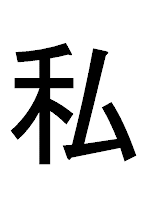No, I'm not going to tell you about a sad, doomed romance between myself and an oriental island country. Rather, cool as that would be, I am going to talk about the Japanese words for "Japan" and "I".
The Japanese call their country 日本 (Nihon/Nippon). The first kanji, 日, means "sun", and the second, 本, means "origin". So, put together, they mean sun-origin. This name comes from the fact that, from the perspective of China, the sun seems to rise up from Japan.
There are two ways to pronounce the name. Nihon is usually used to refer to the island, whereas Nippon is usually used to refer to the state. However, there don't seem to be very many set-in-stone rules in deciding which one to use.
Incidentally, the English word "Japan" comes from the way that the Chinese pronounced 日本 around the fourteenth century — I'm really not sure of the exact time frame.
And now, let's talk about me. Not "me" the writer, but "me" the word, which is the same in Japanese as "I".
In English, a complete sentence must always include a subject. We say "I spent the whole day fighting off aliens with a dead herring" and "she cleaned the angry rhinoceros's snout with a rabid sea sponge". Why, we're even so subject-happy that we include a subject when there is really no subject at all, as in "it rained" and "it snowed".
In Japanese, however, there is no such rule. You can easily get away with just saying "walked" for "I/you/he/she/it/we/they walked". You can, and should. The Japanese don't like to use pronouns except when they are absolutely necessary, in order to prevent confusion.
But, if you do want to say that it was you yourself who did something, then you will need to say one of the words for "I". Yes, I said one of the words — there are actually several to choose from. What's more, some of them are only used by men, and some only by women.
Depending on the situation, a man could choose between 私 (watashi/watakushi), 僕 (boku), 俺 (ore) and a number of others. Women have also have 私 (watashi/watakushi), as well as あたくし (atakushi), あたし (atashi), and so on. I would write a complete list, but I simply don't have a complete list.
I personally have opted for 僕 (boku) — it's not too formal, not too casual, and it doesn't have the feminine feel that 私 (watashi) has in informal speech.
Well, there's enough rambling for now. You can see on the progress bar that I have added $200 to my travel fund - I hope to do this weekly, but we'll see. Now, let's flip out like ninjas!
Thanks to Alex from LearnJapanesePod.com for including the above song in his podcast.
First image retrieved from PlanetWare.
Second image retrieved from Anime.com.






No comments:
Post a Comment